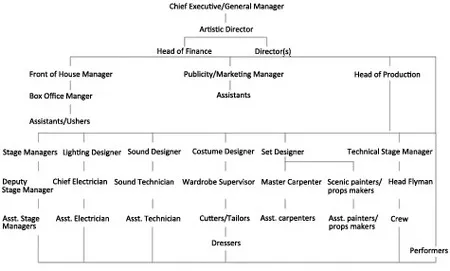![]()
CHAPTER 1
TEAM DYNAMICS AND ROLES
In any group the key to productivity is teamwork. This alludes to the need for an integrated, co-operative and symbiotic relationship between all members. Central to this is the ability of each individual to be adaptable. This will lead to a sense of camaraderie and successful outcomes to team goals. It is essential to realise that a good team will share their skills, abilities and experience in an interactive and flexible way. The diagram below shows the relationship between the various roles within a producing theatre company.
Please note this is just one model of many, and each company will vary depending on its size, financial status and artistic scope. The diagram is somewhat hierarchical, but is useful to demonstrate the layers of responsibility and practical connections between the directors, front of house and producing departments. A more symbiotic diagram is shown at the end of this chapter.
Job roles
As with the diagram above, the responsibilities of the team will differ from company to company. The following descriptions are based loosely on middle to large-scale repertory theatre, but can be applied to most companies.
General Manager/Chief Executive
•Reports directly to the board of governors.
•Has overall responsibility for the general running of the theatre.
•Liaises with the board and artistic director on strategic planning and artistic policies.
•Works with the artistic director and the board to ensure building and staffing costs stay within the yearly budgets allocated.
•Oversees and staffs the front of house and marketing departments.
•Liaises with a board of directors to negotiate contractual terms and engage the artistic director.
Artistic Director
•Liaises with the general manager on the artistic remit, strategic planning and monetary allocations of the company.
•Hires directors and designers.
•Plans the season with respect to in-house and visiting productions.
•Directs a few productions out of the season.
•Liaises with marketing and publicity in developing sponsorship and marketing policies.
Director
•Has overall artistic control of the production they have been hired to direct.
•Liaises with the designers to create the style and concepts integral to the production.
•Responsible for directing the performers, and advising all production departments as to the requirements of the production.
•Maintains an overview of the piece to ensure a cohesive production.
•Liaises with the production manager to ensure budgetary control.
Head of Finance/Finance Manager
•Controls, administrates and keeps account of all spending within the company.
•Responsible for employees’ rights, pay and contracts.
•Originates and distributes allocated budgets to the managers.
Head of Production (PM)
•Employs and supervises all production staff.
•Plans and maintains staffing levels.
•Ensures the staff is trained in safe working practices as required by the Health and Safety policy.
•Responsible for the maintenance and safety of all working areas and equipment as required by the Health and Safety policy.
•Liaises and agrees the budgets and design deadlines with the director and designers.
•Advises the designer about Health and Safety implications within the set design.
•Prepares and distributes the provisional schedule and budgets to all production departments.
•Oversees all ordering of materials and building work.
•Manages and controls the production budget.
•Chairs design and production/ progress meetings.
•Prepares the production risk assessment and advises on action to be taken.
•Schedules and oversees all work during production week.
•Contributes to the technical rehearsal by taking technical notes and scheduling their completion.
•Attends the first performance to confirm the director’s original intent has been achieved.
This book is intended for stage managers; however, there is further information for those who wish to study the role of production manager in more detail (see Index for references.).
Company Manager/Company Stage Manager
A Company Manager is employed to take on responsibilities when a large production goes out on tour. Their responsibilities may include the following;
•Liaising with Marketing Department and Front of House in each venue.
•Organising accommodation for the cast and production team.
•Organising all travel arrangements for the company.
•Organising and monitoring contractual arrangements of the company.
•Looking after the health and wellbeing of the company.
•Providing touring packs to the company.
•Organising the weekly payments of the company.
•Monitoring the weekly hours of the cast.
•Running extra rehearsals/understudy rehearsals during the run.
Some companies hire a Company Stage Manager (CSM) to oversee and complement the existing stage management team/s. If a producing company has two or more stage management teams, this role may be responsible for the following:
•Facilitate and oversee the smooth running and organisation of the stage management teams.
•Monitor, collate and submit the weekly time sheets of the company.
•Look after the...

